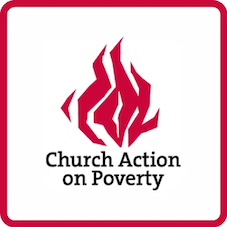Church Action on Poverty statement on 2024 Budget

Source: Church Action on Poverty
Church Action on Poverty has issued the following statement ahead of the 2024 Budget. It includes the views of three CAP expert advisors with direct current experience of poverty. Contributors here are Tracy Porter from Stoke, Stef Benstead from Manchester, and Wayne Green from Shoreham by Sea.
A Budget that further punishes and marginalises people on the lowest Incomes would be "outrageous" and counter-productive.
That's the message today from social justice campaigners with Church Action on Poverty, ahead of Wednesday's Budget announcement in Parliament.
Recent Budgets have rarely provided adequate support or good news for people on low incomes, despite polling showing that 88% of the British public think more should be done to tackle poverty.
Further cuts to public services, now or down the line, would harm communities and people who are most likely to need public systems such as health services, libraries, social housing, public transport, and children's and youth centres.
Three of the charity's advisers, all of whom have direct current experience of poverty, have called for a more just tax system, action to fix the UK's broken housing system; and investment in a long-term future for everyone rather than short-term tweaks.
Stef Benstead said: "I would want them to be increasing taxes on the wealthiest people so they can fund social care and health care properly. When they are spending money, it should be to help poorer people, not funding tax cuts for richer people.
"The Chancellor's supporters say countries with low taxes grow fastest, but that's only in the short term, because you then have a bust. IMF research has shown that the more equal countries grow fastest in the long term because they do not have that bust afterwards.
"We need to look at what makes for steady long-term growth. The answer is to reduce inequality. Data shows we could be much more equal - more equal than Scandinavian countries - and still improve growth. We need to look at what makes for long-term growth, and the way to do that is taxing the very richest, because they currently take too much for themselves.
"It's not a matter of punishing wealth, but of deterring rich people from over-paying themselves excessively while their staff are struggling on low pay."
Wayne Green, from Shoreham by Sea, said: "I'm worried about the ending of the Household Support Fund. It's outrageous. The charity sector and other sectors are saying don't cut it. Doing so would mean even less support for vulnerable people who need it most giving way to an increasing hunger and energy debt crisis.
"A wealth tax is needed. We need an asset tax. Once you earn more than £250,000 you pay less tax as you can afford to invest in assets and shares. If you had something like a 3 percentage point tax increase on offshore wealth, it could pay for so much - it could pay much of our national debt off.
"The very wealthiest people have millions or billions. There is an imbalance - we should be taxing the super rich and investing in this country long-term."
"We need a better form of community tax. It does not work properly. And we need to act on housing, instead of MPs seeking to water down policies like eviction laws."
Tracy Porter from Stoke on Trent said: "We need to commit to meaningful co-production policies with people who have experienced the impact of previous policies. I would also like to see more done to increase digital inclusion. So many people have not got the same access, and that means their opportunities are limited, whereas if they had equal access then people could achieve more.
"It affects young people at school and also older people, who maybe are told to use technology to do tasks and send things. It's not just about having the technology, but also knowing how to use it.
"It is estimated that it costs around £120,000 to raise a child to the age of 18. £120,000 is a lot of money for any household, but if you find yourself unfortunate enough to be at the bottom of the economic scale it becomes even more difficult to provide the basic essentials for that child to flourish.
"A lot of families, in reality, have very few choices. Some families have a disability, learning difficulty or mental health issue, some have to cope with all of these things as well as raising a child to the best of their abilities. Without fair access, children can quickly fall behind and the gap between what they and their peers can achieve grows ever wider. Enter the cost of living crisis and the cracks that were already there, become chasms that are swallowing families up."
Stef Benstead is Church Action on Poverty's adviser on disability and social security, and a member of the charity's Speaking Truth To Power programme. She is also a member of Manchester Poverty Truth Commission and the author of Second Class Citizens: The Treatment of Disabled People in Austerity Britain.
Tracy Porter is a trustee and digital inclusion adviser for Church Action on Poverty, and a member of the Speaking Truth to Power programme.
Wayne Green is Church Action on Poverty adviser on unemployment, social security and policy, and a member of the Speaking Truth to Power programme.


















